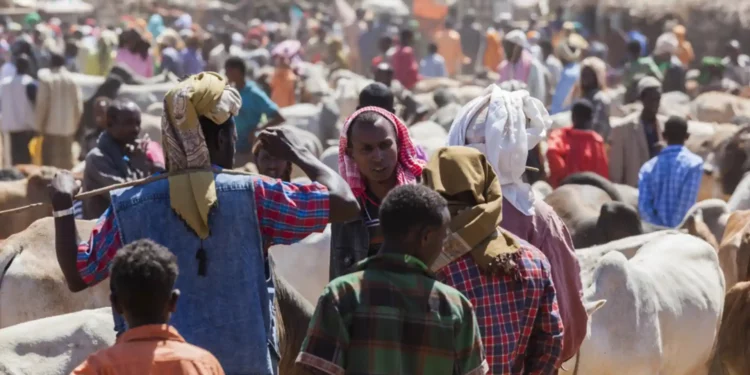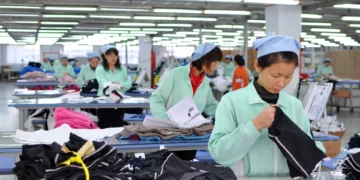Nigeria, Africa’s biggest economy and most crowded country has a poverty rate of 38.9%
The US has a populace of approximately 330 million, while all NATO nations jointly have around 975 million. The total rises to 1.3 billion when the major Asian-Pacific partners of NATO—Japan, South Korea, Australia, and New Zealand—are added.
On the other hand, Russia and China together have a populace of around 1.6 billion individuals. The remainder of the world, including India and a lot of Asia, Africa, the Center East, and Latin America, is home to 5.3 billion individuals. Notwithstanding addressing under 15% of the total populace, NATO nations represent around 31% of the world’s Gross Domestic Product.
After some time, be that as it may, the remainder of the world’s portion of the worldwide economy is supposed to increase, and its international devotion ought not to be underestimated. Africa, specifically, is supposed to turn into a significant supporter of worldwide development over the next hundred years.
Above all, the region has to overcome significant challenges. Even though the continent’s population is expected to rise from 1.4 billion people today to 3.3 billion people by 2075, economic growth has been sluggish, and many African nations are currently experiencing debt crises or are at high risk of experiencing one.
Without strong development, migration pressures are probably going to increase, intensifying political instabilities and prompting far-reaching state disappointment. On the other hand, if African nations figure out how to conquer their ongoing difficulties, their developing geopolitical significance could represent a critical danger to Western interests, particularly as China and Russia grow their financial footprint across the mainland.
Certainly, the difficulties differ from one country to another. Notwithstanding its tremendous oil holds, Nigeria, Africa’s biggest economy and most crowded country, has a poverty rate of 38.9%. Following its second currency devaluation in eight months, and with inflation arriving at 31.7% in February, a cost-of-living crisis has driven numerous global organizations to leave the country.
South Africa keeps on experiencing an intense energy emergency, with cross-country power outages. The joblessness rate expanded to 34.7% in 2023, while yearly Gross Domestic Product development eased back to 0.1%. Egypt’s development has likewise eased back strongly, with inflation running at 36% amid an extended foreign currency crisis exacerbated by the conflict between Israel and Hamas in Gaza and a resulting drop in Suez Canal revenues.
The Egyptian economy may benefit from the recent $8 billion loan agreement with the International Monetary Fund and $35 billion investment agreement with the United Arab Emirates. However, Egypt’s projected 2.8% growth rate for 2024, even if realized, is unlikely to be sufficient to reduce the country’s 60% poverty rate. Egypt’s population grows by 1.4% annually. In the interim, Sub-Saharan Africa’s obligation emergency gives no indications of decreasing.
In December, Ethiopia became the third African country to default starting around 2020. Zambia, which defaulted on its external debt quite a while back, arrived at a restructuring deal with private bondholders as of late, having protected an agreement with its official creditors in June 2023.
Ghana, which defaulted on its external debt in December 2022 in the midst of increasing inflation and a rapid devaluation of its cash, presently can’t seem to agree with its confidential bondholders after the IMF dismissed its proposed restructuring plan. Zimbabwe, wrestling with inflation set off by impractical government spending, has as of late presented its third currency in 10 years and is currently looking for IMF credit.
A few elements are driving Africa’s continuous debt crisis: untenable debt because of fundamental monetary shortcomings, getting for outlandish and possibly foolish framework ventures, an over-the-top guideline that blocks financial development, and political tension for increased social exchanges.
The multiplication of civil conflicts is intensifying these issues. For instance, Ethiopia experienced rapid growth for more than a decade before the outbreak of its civil war in 2020, which compelled the nation to seek assistance from the IMF. Also, the continuous nationwide conflict in Sudan has brought about mass migration and alerts of approaching starvation. Policymakers must implement targeted reforms, supported by strategic debt restructuring and short-term financing, to alleviate the debt crisis and resume imports of essential goods.
If not, unnecessary spending will continue, and financial possibilities will stay grim. However, the assets and consideration African nations now expect far surpass what the IMF and other worldwide organizations can give, and the mounting discontent over the mainland’s absence of monetary advancement is worsening political flimsiness.
Unsurprisingly, Africa has encountered something like 106 successful coups between 1950 and August 2023, with seven – in Chad, Mali, Sudan, Guinea, Burkina Faso, Gabon, and Niger – happening starting around 2021. Geopolitical tensions, especially the heightening competition between the US and China, highlight the dire need to handle Africa’s sovereign obligation emergency and animate monetary development.
By and large, most African nations have depended on Western help, yet this relationship is progressively uncertain, as proven by the 2023 military upset in Niger. Following the overthrow, Niger’s new junta ended key military concurrences with the US, which were pivotal for following radical exercises. Russian powers entered the country toward the beginning of April, driving specialists to presume that keeping a US military presence there would be “difficult, if not impossible.”
Poverty, hunger, and political instability will get worse if African countries with low incomes and a lot of debt don’t get sustainable economic growth. This will make Russian and Chinese offers more appealing. Developed countries, particularly the US and the European Patrons’, ought to help the IMF and the World Bank in helping African nations and advancing development upgrading changes. Africa’s economic and political conditions must improve if the international order that China and Russia seem determined to overturn is to be maintained.

















